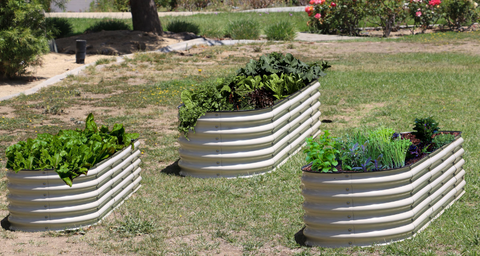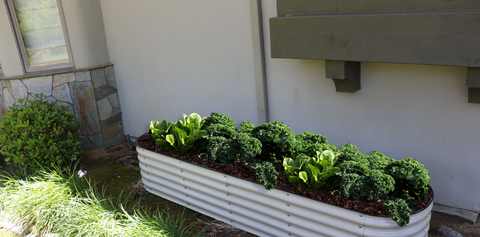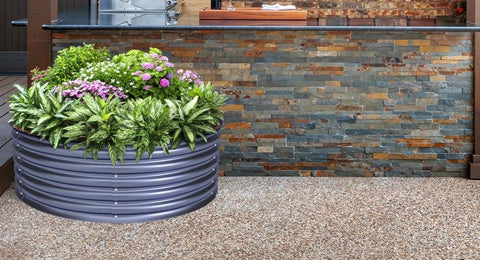Knowledge from Olle Garden Bed: Organic vs. Non-Organic Gardening: A Comparison
The organic horticulture movement has taken over the horticulture world. There is no sign of slowing down in the near future. With the interest in organic horticulture and the use of all natural products, it continues to grow and accelerate. The National Horticultural Association pointed out that in 2004 and 2008, the use of all natural lawn and horticultural products ranged from 5 million to 12 million. The following content also has some reference value for raised garden beds.
More than a decade later, the organic movement continued to make progress in the field of horticulture. In 2019, experts in gardening Wyevale Garden Centers conducted research to show how far ecological gardening has come. Wyevale researchers claim that more than three quarters of modern gardeners try to avoid using chemicals and gardens on their lawns, and reveal that 46% of today's gardeners use organic fertilizers instead of cheaper, more accessible fertilizer options.

The most powerful trend in gardening is to shift from the use of chemicals to a more moderate and comprehensive approach to solving problems in the garden," said a spokesman for Wyevale.
Fertilizers and pesticides are not the only products on the market with all natural or organic labels. These days, plants, seeds, even mulch and potted soil can be found with organic labels. But what does it mean to be all natural, or organic? Compare the advantages and disadvantages of using organic products with those of traditional plants?
Organic Garden Art Language
For labeled plants found in nurseries, "organic certification" is planted without using synthetic products, such as chemical pesticides, herbicides, fungicides and fertilizers. No organic label on any plant can almost guarantee that some type of synthetic product has been used during plant reproduction
USDA (United States Department of Agriculture) has very strict standards that must be met in order for plants to have certified organic seals. The USDA conducts an annual review of all companies that produce such plants to ensure that they continue to use recognized organic production methods.
The "organic" label does not have the same organic standard required for putting it on the package, nor does it guarantee that the product meets the organic certification standard. For example, it can be placed on the potted soil label to refer to the natural ingredients contained therein, such as organic matter, even if the potted soil mixture is not 100% organic. This may confuse terminology and find true organic products somewhat misleading.
Advantages and disadvantages of organic and traditional
Organic gardening is an obvious choice for those who believe in and value the benefits of eating an organic diet. Choosing organic plants is one way to support the selection of nurseries that use the same planting methods as organic farmers. For example, organic nurseries use beneficial insects to control pests and rotate crops regularly. In order to minimize the accumulation of soil borne diseases, organic nurseries continuously shift the planting of each plant from one planting area to another.
Organic plants are usually more expensive and often smaller than plants grown by traditional methods. Compared with traditional nurseries, the method used to grow organic plants is more labor-intensive and usually requires more space to produce the same number of plants.
Non organic plants can usually be planted to potted plants that are fed with natural fertilizers in larger sizes in containers using synthetic fertilizers than organic fertilizers. Non organic nurseries are often responsible for the amount of herbicides, pesticides and fertilizers due to the use of large polluted waterways.
The growth of huge plants requires a lot of chemical input into small containers, and they are always put underground before they bloom crazily. The disadvantage is that once the ground is planted, it is no longer used to and dependent on the artificial soil environment, and its growth may be due to this. These plants are also often rooted, which will increase the impact of transplantation.
Organic gardening is usually less harmful to the environment, pets and humans. Although organic products are usually more expensive than non organic products, natural gardening methods, such as manual weeding instead of using synthetic chemicals, can save gardeners some money, but require more time and effort to complete the work. Organic pesticides, herbicides and bactericides are not only more expensive than their chemical competitors, but they are not always easy to obtain and can not always successfully fight perennial weeds.
On the other hand, non organic products are cheaper, easily available in all garden centers, work faster, and are effective for the widespread use of diseases, weeds, and pests. Non organic products are very useful for tasks such as clearing plots and garden beds, and can be very helpful for sustainable methods such as no tillage or no dig gardening.
Traditional gardening uses chemicals that may be harmful to people, pets, the environment and the wider garden ecosystem. Products containing neonicotine may be harmful to beneficial insects and pollinators (e.g. bees) and soil organisms (e.g. earthworms), which help enrich and aerate the soil.
Non organic pesticides, herbicides and fungicides may be difficult to store and dispose of in a safe manner. The production of such products is energy and carbon intensive and continues in many cases. Excessive use and misuse of such products can lead to charring, drifting and runoff, causing problems for plants, pets and humans.

Organic and traditional plants
Usually there is no good choice, when compared with non organic plants, it involves organic plants. Plants are grown for food, such as vegetables and herbs. Usually, the only types of nursery plants and seedlings available for purchase are grown organically. Any type of plant can be grown organically, but plants grown for consumption have a higher demand for organic forms. Consumers are also used to the fact that the flowering plants are large and cover flowers, so the market for prolific organic flowering plants is bleak.
Gardeners can choose to plant their own plants and use organic technology at home with the help of professional mail order to provide nurseries of organic plants. Unfortunately, in most areas, nurseries and garden centers offer very few organic options, making mail order nurseries the only reliable option for truly combining organic gardens with a variety of plants.
Seeds and plants
Organic seeds are plant seeds grown organically, or using sustainable methods throughout the process. This means that the plants that do not use pesticides or fertilizers and harvest seeds are planted on the land. The use standard has been cultivated for at least three years and is established for "organic certification" agriculture. Organic farmers comply with these standards and then allow their flowers and vegetable plants to be seeded, which produces seed labels with organic certified packaging.
Seeds grown using traditional methods are grown and harvested from insecticide treated plants and fertilized on land that is not cultivated in a sustainable manner, which in turn has such environmental impacts.
Whether you choose to garden organically and to what extent you choose to follow sustainable gardening guidelines is entirely up to you. In the modern world, it is very difficult to achieve sustainable development without great efforts, but there are some techniques that can reduce our burden to a certain extent. Many people buy organic food production, buy carbon compensation for travel or vacation, bring canvas bags to the grocery store instead of using excess plastic and paper bags to carry their groceries, and strive to buy recycled products. Buying organic food seeds, organic planting and planting organic crops are just other ways for people with environmental awareness to support sustainable practice in production.
Sometimes seed companies cannot afford organic certification, but they still make every effort to avoid the use of chemicals and use sustainable methods to grow their products. Usually, these companies state in the introduction page of their seed catalog that they have planted their seeds without chemical pesticides or fertilizers. This is a typical case of having a small family run farm. These companies should get green minded gardeners, as if they were a certified organic company. As long as seed companies use the overall approach to provide seeds, we believe that you are still doing your part to support organic production.
Selection of pesticides: organic pesticides and traditional pesticides
In the United States, less than 90 million pounds of synthetic pesticides are used in lawns and gardens every year, which is actually prohibited in other countries. This accounts for more than 40% of the pesticides used in the United States. Many people attribute the high use rate of chemical pesticides in the United States to the rise of enterprise agriculture and large-scale agricultural enterprises in agriculture, but you may be surprised to find that family gardeners use non organic pesticides more than anyone else.
There are many organic alternatives that you can put into practice and avoid using chemical pesticides in the future. The methods of organic pesticides include selecting insect resistant plants, using nets to reduce the damage of garden pests, and manually selecting harmful insect garden plants instead of using sprays. Organic gardeners can also allow beneficial insects into the garden to help alleviate pest problems.
Although non organic methods are still considered as faster and easier ways to control insects, they also have their own shortcomings. The use of chemicals can be very expensive for gardeners' wallets and the environment. Not only the environment affected by chemical pollution, but also the garden ecosystem of family gardeners is in danger, because chemicals may be harmful to beneficial insects, wild animals, and pets.
Fertilizer
The organic fertilizer method has proved to be a better choice for consumables, such as fruits, herbs and vegetables, because it provides the best taste, and it provides a healthier choice for people (and wildlife) to consume them. Not surprisingly, modern gardeners are more likely to use organic fertilizers for consumables than for ornamental plants.
On the other hand, ornamental gardening can benefit a lot from non organic fertilization methods just like traditional fertilization methods. Synthetic fertilizers provide the strongest concentration of beneficial nutrients and provide the best growth opportunity and bloom in the fastest time. Non organic fertilizers are usually sprayed directly on plants or added to the soil. Unfortunately, some of these fertilizers do have a negative impact on local wildlife.
Cover
Covering is another product with both organic and non organic options. Thirdly, which is better should be left to individual gardeners, and should be based on personal needs, such as maintenance issues, personal preferences and overall purpose, what they need from the cover.
Organic mulch is an outdoor gardener who likes to get his hands dirty at work in the world, because organic mulch, from pine needles and sawdust to shredded bark and compost leaves, will decompose and eventually decompose back into the soil, enrich it and improve its composition in the process.
Organic mulch improves the soil, making it easier for water to be absorbed into the ground layer below the mulch. If you use recycled organic mulch in your garden landscape, such as pine needles and/or chopped leaves, you can be proud of the fact that your approach not only saves you money, but is more environmentally friendly than non organic options.
On the negative side, the organic mulch really tends to lose its luster after several growing seasons, and become dull in the sun after a period of time. If you want to choose coverings, the organic choice does not provide many kinds of coverings, but not organic ones, such as rocks, plastics, pebbles or shredded rubber. There are a wide range of color choices, which will help beautify your outdoor decoration.
Non organic coverings are also more permanent solutions, because the products used usually do not deteriorate for a long time and usually do not require any replacement. Non organic coverings, such as stones, can work wonders to enhance certain garden styles and create unique visual effects of interest in garden beds and trails. Stone, rock and cobblestone are available in a variety of colors and textures, which can be matched with almost any style of decoration.
The rubber covering has the advantages of stones, rocks and pebbles, but also has additional advantages, such as permeable water, which is not attractive to many types of insects. It is very suitable for the following areas: children are playing, because it provides a softer and more cushioned base to help minimize injuries caused by falls.
Non organic mulch also has its disadvantages, because people will expect it. Stones and rocks will generate more heat, which is attracted to the garden plants and the soil they live in, increasing the demand for water and requiring more rain or artificial irrigation. Unless you install plastic or mesh landscape fabrics, weeds are another factor to consider, because manual weeding can eventually add a lot of extra work to the garden.
Which method is right for you?
From organic marketing to gardening, the advantages and disadvantages of organic gardening were widely supported by the champion on both sides of the argument. This article is not intended to favor any party, but to list some available facts so that readers can make their own decisions in an informed manner. In the final analysis, it depends on everyone's personal gardener to decide whether to plant, buy or even organic food.
The word organic has different meanings and is associated with different gardening tasks under the following circumstances. Especially for seeds and plants, organic means they grow without synthetic fertilization, genetic engineering, irradiation or chemical pesticides. This is the only way to cultivate organic agricultural products. Organic meat comes from animals with the following characteristics that have only been exposed to organic plants and eaten organic food, and have not been treated with drugs containing synthetic ingredients, such as growth hormone and antibiotics.

Does organic mean better? Although intuition leads us to say yes, research in this field is more uncertain than you might think. Recent studies have shown that organic food has nothing to do with taste or nutritional advantages. Organic agricultural products show that pesticide residues are 30% less than non organic agricultural products, but both are completely within the legal limits.
Environmental impact is one of the most compelling arguments for increasing organic planting practices, as concerns about the rise in chemical and drug runoff. Organic farms and gardens are generally more stable and often better practiced in environmentally friendly gardening methods, such as crop rotation and planting mulch crops to improve the soil. However, in the final analysis, it is up to you to decide whether to plant, purchase and consume organic gardening, which is very suitable for you and your family, when it comes to your choice of organic gardening or non organic gardening practice.
There is no strict rule that you should use 100% organic or 100% traditional in your garden, so use the method that is most suitable for you and most meaningful for your priority. You may decide to compost, but still choose to spray pests. Or you may choose to use natural methods to prevent pests, but still want to fertilize your plants with synthetic mixtures. There is no right or wrong way to garden, so don't feel you have to agree with one side completely. Either way, gardening is a wonderful hobby that can help you and nature, giving you the opportunity to create and cultivate plant life in your own backyard.
